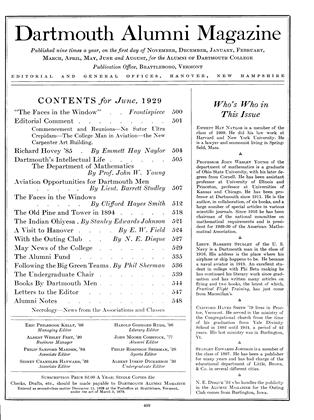By E. Gordon Bill, Dean of Freshmen, Dartmouth College; published in the Bulletin of the High School Teachers' Association, New York City.
This article is reprinted from a speech given by Dean Bill last month at the annual meeting of the association in the Hotel Astor. He discussed the qualifications for admission to Dartmouth College and then went on to the recent study made by the American Tel. and Tel. Company of the relation between high grades in college and high salaries in business. The following paragraph gives the jist of this study:
"The correlation between scholastic success in college of about four thousand of this company's employees and financial success with the A. T. & T. is striking. If the salaries of these men are plotted the curve representing the median salary of the entire group being a straight line at sa,y one hundred, it is found that the median salary of the men who were in the lowest third of their classes at college is represented by a decreasing curve below the median line, whereas the salary curve of the men in the upper tenth of their classes at college is a sharply rising curve above the median line. As a matter of fact, after thirty years' service the lowest third scholastically have a salary represented by seventy-nine, the median of the entire group by one hundred, men in the top third of their classes one hundred and twenty, and those in the top tenth one hundred and fifty-five. Looked at from another angle, forty-eight percent of the highest salaried group of this company comes from men who were in the top third of their classes at college, whereas only twenty-two percent of this high salaried group comes from the lowest third. Finally, and most easy to remember of all, if we consider the very highest ten per cent of the salaried group, we find that seventeen per cent of these men were in the upper ten per cent of their classes at college, whereas only four and one-half per cent were in the lowest third. In other words, the chances of reaching one of the highest salaried levels are four times as good if a man is a top tenth scholar than if he is a lowest third scholar."
Professor W. J. Rose is the author of "Stanislas Konarski," a biography which will be reviewed in a future number of the MAGAZINE. This was published in London by Jonathan Cape.
THE PATRON SAINT OF THE OUTING CLUB Again the Outing Club honors the Rev. John E. Johnson of the class of 1866 by electing him honorary president for 1929-1930. Some men have a hobby for books, others for horses, but Mr. Johnson's hobby is the outdoors and because of his interest and influence hundreds of Dartmouth men have been brought to know the beauties of the north country through the Outing Club, and the effect of the outdoors upon the lives and careers of Dartmouth men is enormous.
 View Full Issue
View Full Issue
More From This Issue
-
 Article
ArticleThe Faces in the Windows
June 1929 By Clifford Hayes Smith '79 -
 Article
ArticleAviation Opportunities for Dartmouth Men
June 1929 By Lieut.Barrett Studley,U.S.Navy -
 Class Notes
Class NotesCLASS of 1923
June 1929 By Truman T.Metzel -
 Lettter from the Editor
Lettter from the EditorEditorial Comment
June 1929 -
 Article
ArticleA Visit to Hanover
June 1929 By E.W.Field -
 Class Notes
Class NotesCLASS of 1898
June 1929 By H.Philip Patey
Books
-
 Books
BooksThe Arts Anthology, a Book of Poetry
MAY 1930 -
 Books
BooksAmerican Ski Annual, edited
January 1937 -
 Books
BooksADVANCED ORGANIC CHEMISTRY
February 1950 By Elden B. Hartshorn '12 -
 Books
BooksDR SCARLETT:
November 1936 By H. M. Dargan -
 Books
BooksTHE STORY OF NEW ENGLAND,
January 1942 By Herbert F. West '22. -
 Books
BooksGROW IN GRACE.
DECEMBER 1958 By MIRIAM DEWEY ROSS


